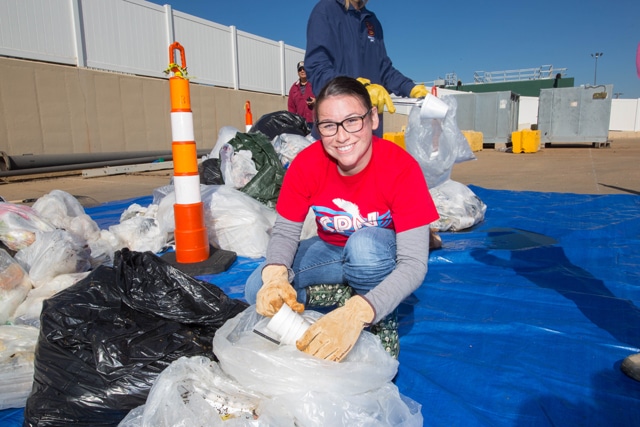
The event may not have had a pretty name, but it was serious business at the Grand Casino Hotel Resort as the Citizen Potawatomi Nation hosted a tribal waste characterization training program in conjunction with the EPA.
Organized through the U.S. Environmental Protection Agency’s Region 6 Office, which oversees the states of Arkansas, Louisiana, New Mexico, Oklahoma, Texas and 66 Tribal Nations, environmental professionals from across the region met at the Grand to sort through the trash.
“The training is important for a lot of professionals in our field, as we received a number of helpful updates on how best to conduct a waste assessment. A lot of people think it is just sorting through the trash, but it’s about knowing what materials can be disposed of properly and at the lowest cost to an organization’s budget,” said CPN Tribal Energy and Sustainability Specialist Tara Hammer.
The trainings, which are free, provide a base for environmental professionals from a wide range of organizations to learn how to best assess the type of waste materials produced in their respective communities. By learning how to identify and ultimately dispose of these waste products, from office supplies to household trash materials, communities are better able to develop their own waste management plans. Knowing the types and amounts of the materials and waste your community is generating, you can better evaluate waste management options and identify opportunities for cost savings,” wrote Roger Hancock, Tribal Solid Waste Coordinator for EPA’s Region 6.
The training session at the Grand Casino took place with a half day of classroom sessions where attendees learned about the strengths and limitations of different types of waste assessments and the best practices to implement when proceeding through an actual waste sort. This also included a ‘how to’ session on the best way to implement proper safety considerations, as there are occasionally situation where hazardous or other possibly dangerous materials are improperly disposed of.
The training ended with everyone heading out into a bright, warm Oklahoma fall day and conducting a practice waste assessment. Participants literally got their hands dirty, or at least their leather lined gloves, identifying and sorting through materials that they would see back in their respective communities.
To learn more about CPN’s Department of Environmental Health’s work, visit cpn.news/OEH. To learn more about the EPA Region 6’s tribal training programs, visit cpn.news/EPA1512.
